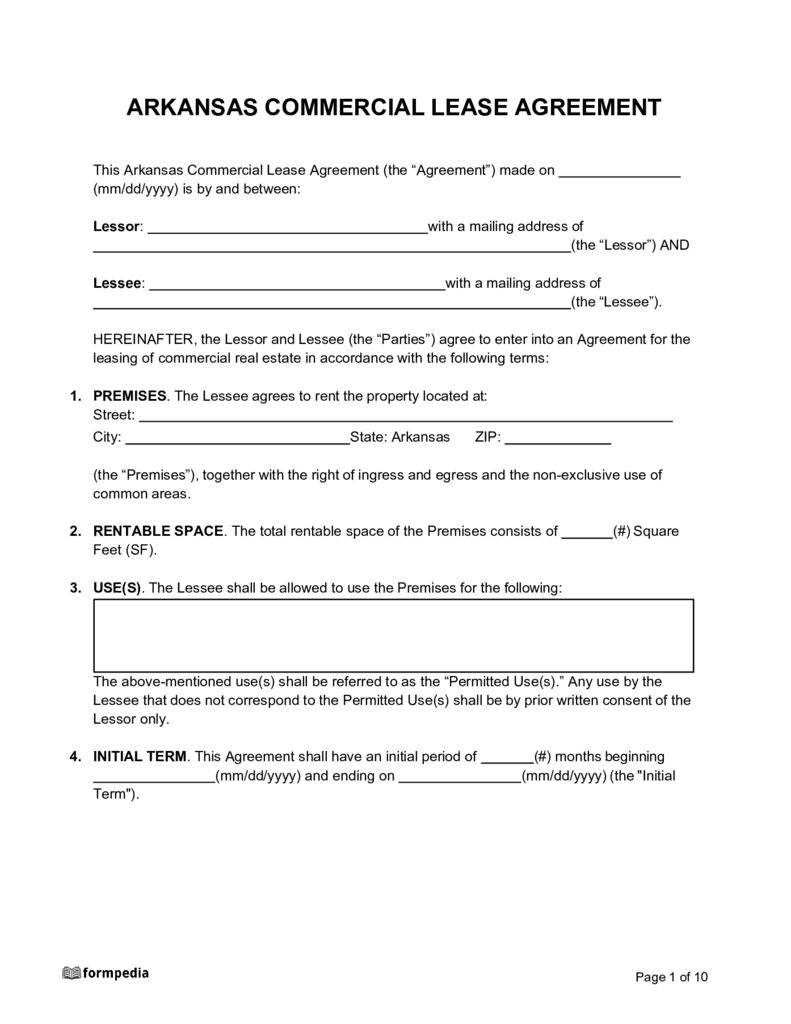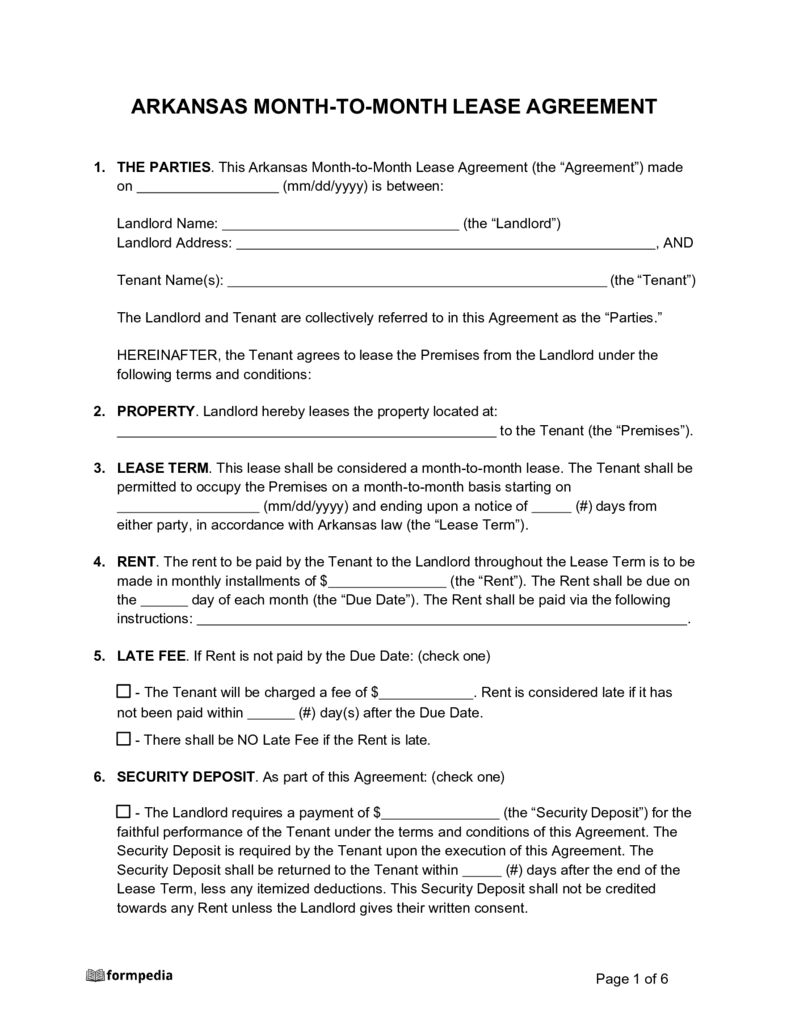An Arkansas rental lease agreement is a foundational document establishing a contractual relationship between a landlord and a tenant. This legally binding contract delineates the terms, conditions, and expectations for both parties during the rental period. Governed by the Arkansas Residential Landlord-Tenant Act of 2007, these agreements ensure fairness, transparency, and protection for landlords and tenants. Within this framework, landlords must provide habitable premises, while tenants must adhere to the stipulated terms, including timely rent payments and property care.
Lease Agreements: By Type (2)
Commercial Lease Agreement
A contract tailored for renting out business-related properties.
Download: PDF | Word (.docx) | OpenDocument
Rent-to-Own Agreement (Lease Option)
Provides tenants an opportunity to eventually purchase the rented property.
Download: PDF | Word (.docx) | OpenDocument
Month-to-Month Lease Agreement
A flexible arrangement that auto-renews every month unless terminated by either party.
Download: PDF | Word (.docx) | OpenDocument
Roommate Agreement
A contract that defines terms and conditions between individuals cohabiting in a single property.
Download: PDF | Word (.docx) | OpenDocument
Standard (1-year) Lease Agreement
The most prevalent type, typically spanning a duration of one year.
Download: PDF | Word (.docx) | OpenDocument
Sublease Agreement
Permits an existing tenant to lease their rented space to a third party.
Download: PDF | Word (.docx) | OpenDocument
Landlord and Tenant Act, Simplified
Required Disclosures
In the state of Arkansas, landlords must disclose specific information to tenants, usually in the lease or rental agreement.
Contact Information (§ 18-17-302 & § 18-17-303): Landlords or property managers must operate in good faith and provide clear notice or notification to tenants. This typically includes disclosing the names and addresses of the property owner and any person authorized to manage the property.
Tenant’s Maintenance Responsibilities (§ 18-17-601): Tenants must maintain their dwelling units, which includes obligations like keeping the unit clean, disposing of waste properly, and not causing intentional damage. Landlords should disclose these responsibilities to ensure tenants are aware.
Landlord’s Right of Access (§ 18-17-602): Tenants cannot unreasonably deny landlords access to the property for purposes like inspections, repairs, or showing the property to potential buyers or renters. However, tenants also have the right to privacy, which landlords must respect.
Tenant’s Use of Property (§ 18-17-603): Tenants must use their dwelling unit primarily as a residence and must not conduct or permit any illegal activities on the premises.
Lead-Based Paint Disclosure: For homes built before 1978, federal law mandates landlords to provide tenants with a lead-based paint disclosure. This informs tenants about the potential presence of lead-based paint and provides a pamphlet about its hazards.
Rent Guidelines
In the state of Arkansas, there are specific guidelines and regulations surrounding rent that both landlords and tenants must adhere to, usually outlined in the lease or rental agreement.
Rent Amount and Due Date (§ 18-17-401): The landlord and tenant can agree upon the rent amount and its due date. Unless otherwise specified, rent is payable without demand or notice at the time and place agreed upon by both parties.
Place of Payment (§ 18-17-401): Unless the tenant is otherwise notified in writing, rent is payable at the dwelling unit. If the rent is periodic, it’s payable at the beginning of any term of one month or less and otherwise in equal monthly installments at the start of each month.
Termination for Nonpayment (§ 18-17-701): If rent remains unpaid when due and the tenant fails to pay within five (5) days from the due date, the landlord has the right to terminate the rental agreement.
Rent Increases and Changes: While the provided statutes do not specify guidelines for rent increases, it’s common practice for any changes in rent or terms to be communicated in writing and in advance. Referring to the lease agreement for specifics on rent adjustments is essential.
Payment After Eviction Proceedings (§ 18-17-911): After the commencement of eviction proceedings, the tenant remains liable for rent as long as they occupy the premises. The rent continues to accrue at the rate that was in place before the eviction proceedings began.
Security Deposits
In Arkansas, landlords and tenants have specific obligations and rights concerning security deposits. The state’s statutes govern these to ensure fairness and clarity in rental agreements.
Maximum Security Deposit (§ 18-16-304): A landlord cannot demand or receive a security deposit that exceeds two (2) months of periodic rent.
Refund of Security Deposit (§ 18-16-305): Within sixty (60) days of the tenancy’s termination, the landlord must return the security deposit to the tenant. The deposit can be used to cover unpaid rent and any damages due to the tenant’s noncompliance with the rental agreement. The deductions must be itemized in a written notice delivered to the tenant. If the landlord mails the refund and the letter is returned, and the tenant cannot be located after reasonable efforts, the payment becomes the landlord’s property after one hundred eighty (180) days from the mailing date.
Remedies for Non-compliance (§ 18-16-306): If a landlord does not adhere to the security deposit regulations, the tenant can recover: The property and money owed to them., Damages amounting to twice the wrongfully withheld sum., Costs, and reasonable attorney’s fees. The landlord will only be liable for costs and the wrongfully withheld amount if they can prove that the noncompliance was due to an error despite having reasonable procedures in place or was based on a good faith dispute regarding the amount due.
Terms and Conditions in a Rental Agreement
In Arkansas, rental agreements are essential documents that outline landlords’ and tenants’ rights and responsibilities during the tenancy period.
Inclusion of Terms (§ 18-17-401): Landlords and tenants can include terms and conditions in a rental agreement that are not prohibited by the Arkansas Residential Landlord-Tenant Act or any other applicable law. This can encompass rent amount, the term of the agreement, and other provisions detailing the rights and obligations of both parties.
Duration of Tenancy (§ 18-17-401): Unless the rental agreement specifies a definite term, the tenancy is considered week-to-week for roomers who pay weekly rent. In all other cases, it’s month-to-month.
Tenant Obligations (§ 18-17-601): Tenants have specific obligations, including maintaining the dwelling unit, complying with building and housing codes, disposing of waste appropriately, and not causing damage to the premises.
Landlord Obligations: While the provided statutes do not detail all landlord obligations, landlords typically have duties such as ensuring the premises are habitable, making necessary repairs, and respecting the tenant’s right to quiet enjoyment.

